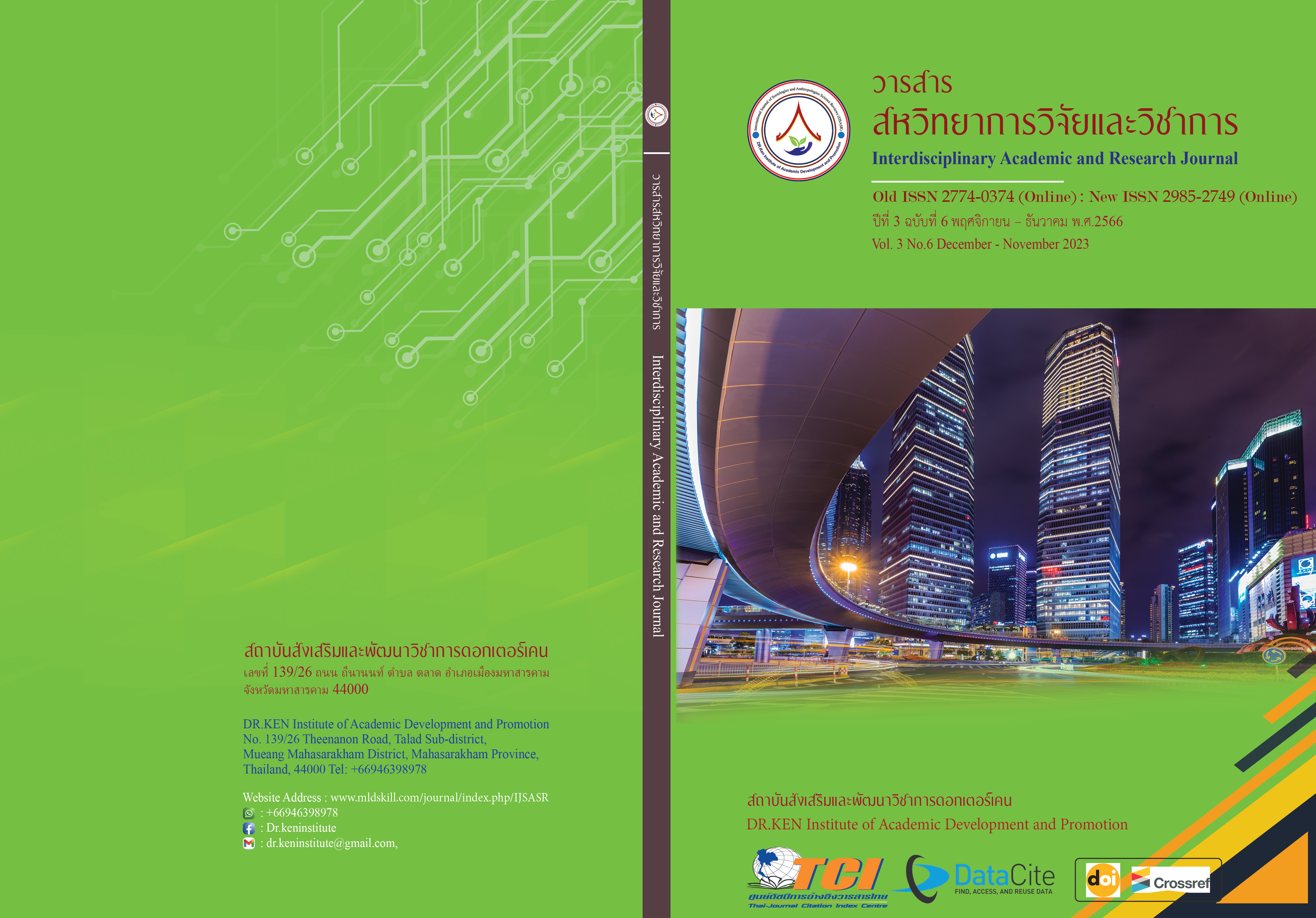Effects of Organizing a Phenomenon-Based Learning Experiences to Enhance Growth Mindset Characteristics for Preschoolers
DOI:
https://doi.org/10.60027/iarj.2023.272063Keywords:
Phenomenon-based; , Growth Mindset Characteristics; , PreschoolersAbstract
Background and Aims: Phenomenon-based learning is a form of learning that is effective, interesting for children, and consistent with the guidelines for developing growth mindset characteristics. Phenomenon-based learning is learning that begins with actual phenomena around the child. The purposes of this research were (1) to study the effectiveness index of lesson plans using the phenomenon-based learning experience and (2) to assess and compare preschoolers’ growth mindset characteristics before and after the experiment.
Methodology: The research participants consisted of 25 preschoolers aged 3 to 4 years. Each 50-minute experimental session was executed four times a week for a total period of eight weeks. The lesson plans were implemented in four main phases: (1) Select the phenomenon of interest and observe the phenomenon of joint research. 2) Identify the issue and probe the phenomenon of interest. (3) Take action through a problem-based inquiry learning process. (4) Presentation, actual reflection, and assessment. The research instrument used was a performance rubric for the preschoolers’ growth mindset characteristics. The statistical analyses used in the present study were the effectiveness index and calculations for mean, standard deviation, and t-test.
Results: (1) the index of effectiveness of the lesson plans was equal to 0.81, indicating that the participants showed an 81.27 percent improvement in their growth mindset characteristics; (2) the growth mindset characteristics of preschoolers after the experiment were significantly higher than before the experiment at the .05 level of significance. The results of this research indicate that using a phenomenon-based learning experience can enhance the growth mindset characteristics of preschoolers.
Conclusion: The research found that using the phenomenon in the learning plan resulted in kindergarten children developing growth mindset characteristics up to 81.27 percent and was statistically significant at the .05 level, resulting in the belief that this plan is an alternative. It is effective in enhancing the growth thinking development of kindergarten-age children and has a statistically significant effect.
References
กระทรวงศึกษาธิการ. (2560). หลักสูตรการศึกษาปฐมวัย พุทธศักราช 2560. กรุงเทพฯ: ชุมนุมสหกรณ์การเกษตรแห่งประเทศไทย.
กุลยา ตันติผลาชีวะ. (2551). การจัดประสบการณ์การเรียนรู้สำหรับเด็กปฐมวัย. กรุงเทพฯ: เบรนเบส บุ๊คส์
ชลาธิป สมาหิโต. (2562). การจัดประสบการณ์การเรียนรู้โดยใช้ปรากฏการณ์เป็นฐานสำหรับเด็กปฐมวัย. วารสารมหาวิทยาลัยศิลปากร, 39(1), 113-129.
ชุติกานต์ เอี่ยวเล็ก และอรทัย อนุรักษ์วัฒนะ. (2563) ผลการจัดประสบการณ์การเรียนการสอนโดยใช้ปรากฏการณ์เป็นฐานเพื่อพัฒนาทักษะการคิดอย่างมีวิจารณาญาณของนักศึกษาครู. วารสารศึกษาศาสตร์มหาวิทยาลัยศิลปกร. 20 (1), 257-273.
นพรดา คำชื่นวงศ์. (2563). การพัฒนากรอบความคิดที่ถูกต้องของเด็กปฐมวัย. วารสารวิชาการคณะศึกษาศาสตร์ มหาวิทยาลัยราชภัฏเชียงใหม่, 14(2), 12-22.
วัฒนชัย วินิจจะกูล. (2564). การศึกษาไทยกับโลกยุคใหม่: ทักษะแห่งศตวรรษที่ 21 กับการพัฒนาคุณภาพการศึกษา. วารสารวิชาการ คณะศึกษาศาสตร์ มหาวิทยาลัยราชภัฏอุบลราชธานี, 11(3), 11-21.
ศูนย์จิตวิทยาการศึกษามูลนิธิยุววสถิรคุณ. (2558). การพัฒนากรอบความคิด Growth Mindset. Retrieved from: https://pubhtml5.com/tdpk/whwk/basic/
สำนักงานกองทุนสนับสนุนการสร้างเสริมสุขภาพ. (2561). การส่งเสริมกิจกรรมทางกายในสถานศึกษา. สืบค้น 12 มกราคม 2566. จาก https://www.thaihealth.or.th/ส่งเสริมกิจกรรมทางกายใ-2/
อรพรรณ บุตรกตัญญู. (2561). การเรียนรู้โดยใช้ปรากฎการณ์เป็นฐานเพื่อการสร้างมุมมองแบบองค์รวมและการเข้าถึงโลกแห่งความจริงของผู้เรียน. วารสารครุศาสตร์ จุฬาลงกรณ์มหาวิทยาลัย 46(2), 348-365.
อรพรรณ บุตรกตัญญู. (2563). หลักสูตร : การคิดเชิงคำนวณกับกิจกรรมประจำวันของเด็กปฐมวัย. กรุงเทพฯ:ภาควิชาการศึกษา คณะศึกษาศาสตร์: มหาวิทยาลัยเกษตรศาสตร์.
Alerson, L. (2017). Growth Mindset: The Door to Achieving More. Retrieved, 12 January 2023.https://www.free-ebooks.net/ebook/Growth-Mindset-The-Door-to-Achieving-More/pdf?dl&preview
Andersen, S.C., & Nielsen, H.S. (2016). Reading intervention with a growth mindset approach improves children’s skills. Proceedings of the national academy of sciences, 113(43), 12111-12113.
Apergi, A., Anagnostopoulou, A., & Athanasiou, A. (2015). E-Learning for Elementary Students: The Web 2.0 Tool Google Drive as Teaching and Learning Practice. World Journal of Education. 5 (3), 1-7. DOI: https://doi.org/10.5430/wje.v5n3p1
Bredekamp, S., & Copple, C. (1997). Developmentally Appropriate Practice in Early Childhood Programs. (Revised Edition). Washington, DC: NAEYC.
Campbell, J.T. (2019). COSMIC: the catalog of somatic mutations in cancer. Nucleic acids research, 47(D1), D941-D947.
Daehler, K., & Folsom, J. (2016). Making Sense of SCIENCE: Phenomena-Based Learning. Retrieved, 12 January 2023. from http://www.WestEd.org/mss
Dweck, C., Walton, G., & Cohen, G. (2014). Academic Tenacity: Mindset and Skills that Promote Long–Term Learning.
Dweck, C.S. (2006). Mindset: The New Psychology of Success: How We Can Learn to Fulfill our Potential. New York, NY: Ballantine.
Fogarty, R. (2016). Invite Excite Ignite: 13 Principles for Teaching, Learning, and Leading, K – 12. New York, NY: Teachers College Press.
Gunderson, E., Gripshover, S., Romero, C., Dweck, C., Goldin-Meadow, S., & Levine, S. (2013). Parent Praise to 1- to 3-Year-Olds Predicts Children's Motivational Frameworks 5 Years Later. Child development. 84 (5),. Doi:10.1111/cdev.12064.
Illinois Center for School Improvement (2016). Habits of Mind-Developing a Growth Mindset. Material for the Illinois Center for School Improvement, a Partnership between the Illinois State Board of Education and the American Institute for Research, is Federally Funded Unless Otherwise Noted.
Kompa, J.S. (2017). Remembering Prof. Howard Barrows: Notes on Problem-Based Learning and the School of the Future. Retrieved July 6, 2018 from: https://joanakompa.com/2017/02/28/remembering-prof-howard-barrows-a-small-note-on-the-school-of-the-future-and-the-future-of-learning/
NICHD Early Child Care Research Network (1997). The Effects of Infant Child Care on Infant-Mother Attachment Security: Results of the NICHD Study of Early Child Care. Child Development, 68, 860-879. https://doi.org/10.1111/j.1467-8624.1997.tb01967.x
OECD (Organisation for Economic Co-Operation and Development). (2019). Education at a Glance 2019: OECD Indicators. OECD Publishing. https://doi.org/10.1787/f8d7880d-en
Silander, P. (2015). Phenomenon-based learning rubric. Retrieved, 12 January 2023. From: http://nebula.wsimg.com/c58399e5d05e6a656d6e74f40b9e0c09?AccessKeyId=3209BE92A5393B603C75&disposition=0&alloworigin=1
Stanger, N. (2015). What is the relationship between outdoor time and physical activity, sedentary behavior, and physical fitness in children? A systematic review.International journal of environmental research and public health, 12(6), 6455-6474.
Thorndike, E.L. (1913). Education Psychology: Briefer Course. Routledge, New York.
Weber, J. (2018). Growth Mindset Interventions: Lessons from Across Domains. Netherlands: University of Groningen.
Downloads
Published
How to Cite
Issue
Section
License
Copyright (c) 2023 Sirikhwan Niyomphon, Siraprapa Phruttikul, Chaweng Sonboon

This work is licensed under a Creative Commons Attribution-NonCommercial-NoDerivatives 4.0 International License.
Copyright on any article in the Interdisciplinary Academic and Research Journal is retained by the author(s) under the under the Creative Commons Attribution-NonCommercial-NoDerivatives 4.0 International License. Permission to use text, content, images, etc. of publication. Any user to read, download, copy, distribute, print, search, or link to the full texts of articles, crawl them for indexing, pass them as data to software, or use them for any other lawful purpose. But do not use it for commercial use or with the intent to benefit any business.
















.png)


